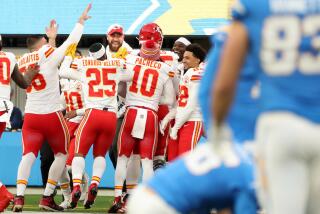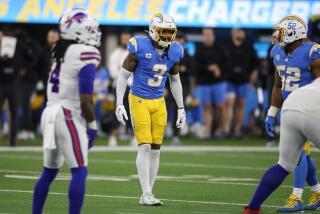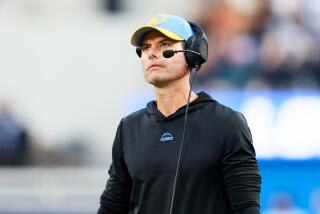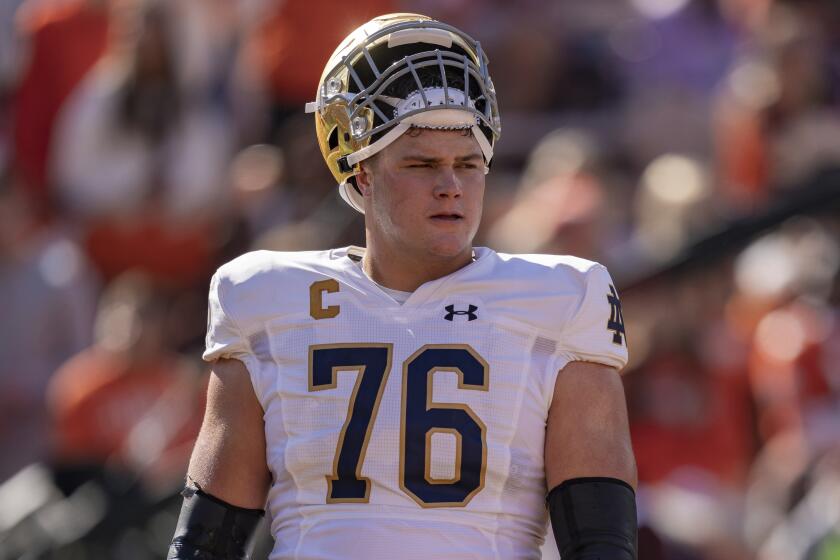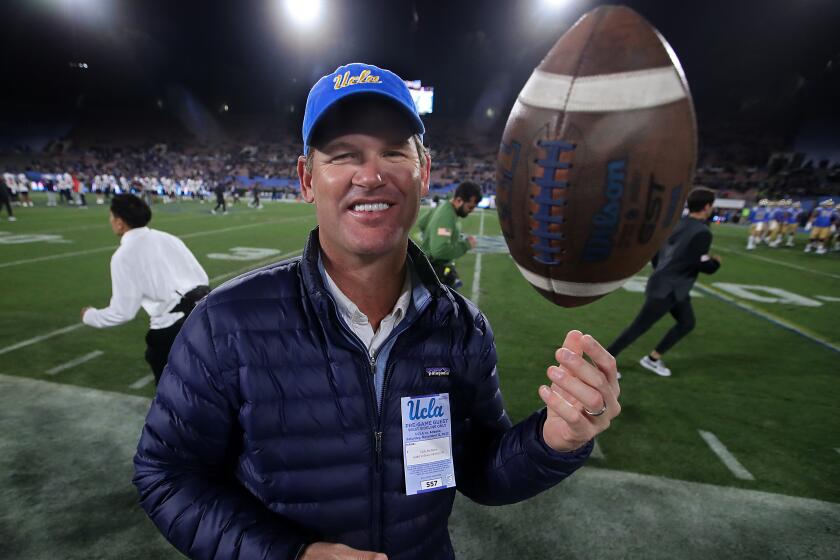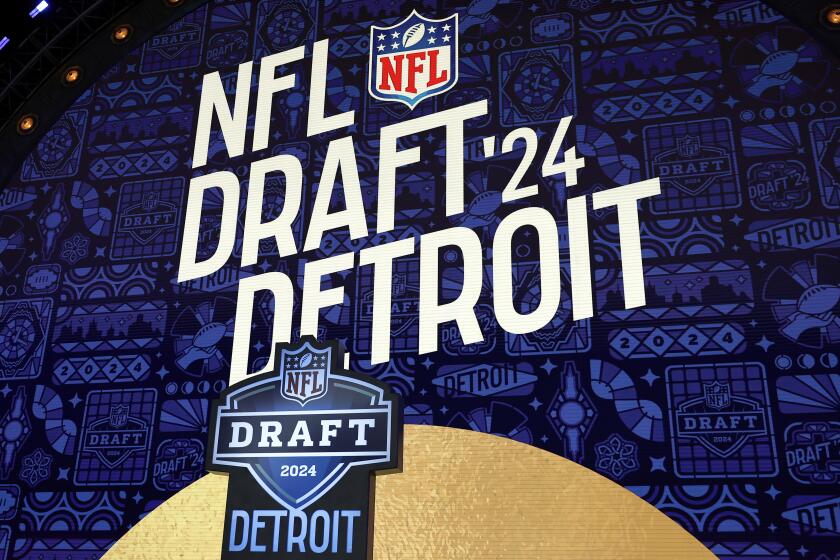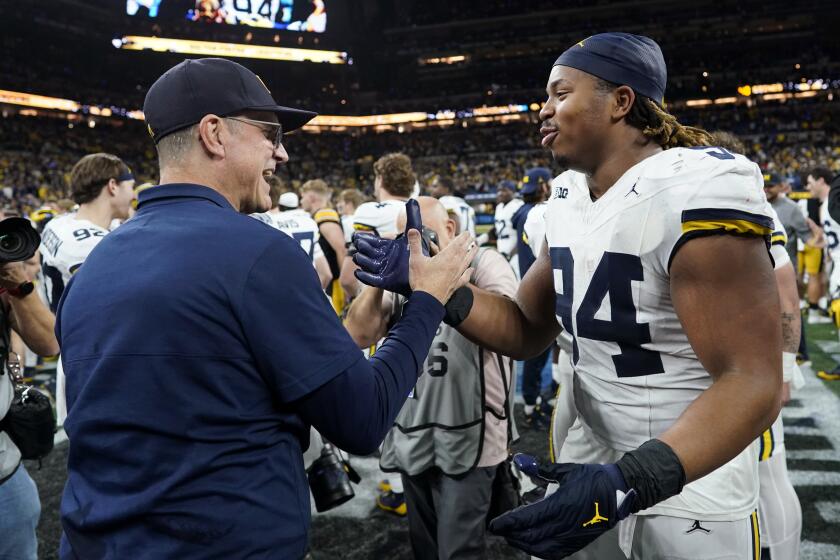Chargers contend with a pile of ‘what ifs’ as they try to keep playoff hopes alive in Week 16
The Chargers have a chance to continue their improbable trip to a playoff berth Sunday.
Beat the Jets at MetLife Stadium in New Jersey and get some favorable results from around the league, and the team can continue clinging to the hope that it can become the second to start 0-4 and qualify for the playoffs. The Chargers also did that in 1992.
And the Chargers should win. They’ve got the deeper roster, more weapons on offense and more playmakers on defense. They’ve got nothing but incentives.
But, there’s one statistic not on their side; one set of numbers the Chargers aren’t quite sure how to figure.
Since the start of this season, the Chargers are winless when tight end Hunter Henry has gotten fewer than five targets. And with Henry on the injured-reserve list with a lacerated kidney, it’s safe to say he won’t be a part of the Chargers’ game plans.
When Henry has been a featured receiver, the team has gone 7-1, the lone loss coming in Week 2 against Miami. It’s a peculiar stat that could mean a lot of different things or absolutely nothing at all, depending on who is asked.
Offensive coordinator Ken Whisenhunt said using “targets” as a measure might be flawed when he was asked about the stat this week.
“I bet if we sat down and looked at what was called that was supposed to go to him and didn’t because of coverage, or [other reasons], we’d see that doesn’t matter,” Whisenhunt said. “Because when you say something like that, it makes it sound like we were not trying to throw the ball to him.
“There were many times where earlier in the year there were comments from you guys about, ‘Well, we didn’t try to get it to him.’ Well, we called seven plays to him, they didn’t go to him. Once again, I’m not being critical. That’s what you do. You can question it.”
To clarify, “five targets” isn’t a magic number. It’s almost certainly a coincidence. But perhaps a better way to examine Henry’s impact would be cumulatively.
In the team’s seven wins this season, Henry was targeted 45 times. He caught 30 passes for 437 yards and three touchdowns. In the Chargers’ seven losses, he was targeted only 17 times, catching 15 passes for 142 yards and one touchdown.
Perhaps, as Whisenhunt suggested this past week, defenses were rightfully paying extra attention to the second-year tight end.
“It’s more driven about what the defense does,” Whisenhunt said. “What do you want us to do, throw it at him 15 times and not look at Keenan [Allen]? Not throw it to any of the other guys? We’re about trying to complete it and move the ball down the field.
“For a four-week period before Kansas City, we were doing better than anybody in the league. So it’s going to be spread around. Sometimes teams try to take certain players away.”
Maybe the stat suggests this too: The Chargers are at their most vulnerable when they’re unable to get the ball to their best players for whatever reasons.
While the numbers aren’t as sharply inverted, Allen — the Chargers’ unquestioned top receiver — has averaged fewer catches and fewer targets in the team’s losses too.
As with Whisenhunt, Chargers coach Anthony Lynn said he doesn’t think there’s too much to Henry’s targets being related to wins and losses.
“I’m a stat guy, I like numbers. Sometimes they point you in the right direction, but sometimes numbers can be misleading,” Lynn said. “There are times when a defense can take away a certain guy, and you have to hurt them with different weapons. We tried to do that as best we could this year, but Hunter has been a big part of our offense, and when he’s healthy, we need to get him the ball.”

Amazingly, the Chargers still have a path to the playoffs ... and it isn’t that weird to think they might make it. LA Times beat writer Dan Woike breaks down the scenarios with U-T reporter Annie Heilbrunn.
Maybe the bigger problem is that the Chargers weren’t able to find different weapons when defenses keyed in on their top playmakers. In the games when the Chargers have targeted Henry five or more times, the team averaged 26.6 points. When they’ve been forced — or failed — to look his way, they’ve scored more than 17 points once.
And if defenses were focused on taking Henry or Allen out of the game, the Chargers certainly could’ve figured other ways to ensure their top guys still got touches. Allen, for instance, was able to catch at least 10 passes in three straight games earlier this season, surely with the defense paying a lot of attention.
To counter that, the Chargers moved Allen around the field, having him even line up in the backfield in order to confuse the defense.
Quarterback Philip Rivers, who in a sense is ultimately most responsible for whether Henry gets targets, said there might be something to the numbers.
“There may be a direct correlation there,” he said. “I do know Hunter’s a good player for us and we need him involved as much as possible. That’s something to look back on and say, ‘Golly, maybe that’s what we were missing in some of these games.’ ”
Whisenhunt said the Chargers haven’t entered a game this season without Henry as a part of the game plan.
“I can just say this. When we plan every week, we always have things that we think we’re trying to get to Hunter and all of our guys,” he said. “They just don’t always work out that way.”
The Jets won’t have to worry about Henry on Sunday. The Chargers won’t have to worry about getting him the ball. He won’t be on the field again this season.
If the offense struggles in the final two weeks or if the Chargers fall short of their postseason goals, surely observers will wonder “what if” about Henry and his role. But with two regular-season games remaining, the Chargers’ playoff hopes include plenty of other ifs.
Twitter: @DanWoikeSports
More to Read
Go beyond the scoreboard
Get the latest on L.A.'s teams in the daily Sports Report newsletter.
You may occasionally receive promotional content from the Los Angeles Times.
